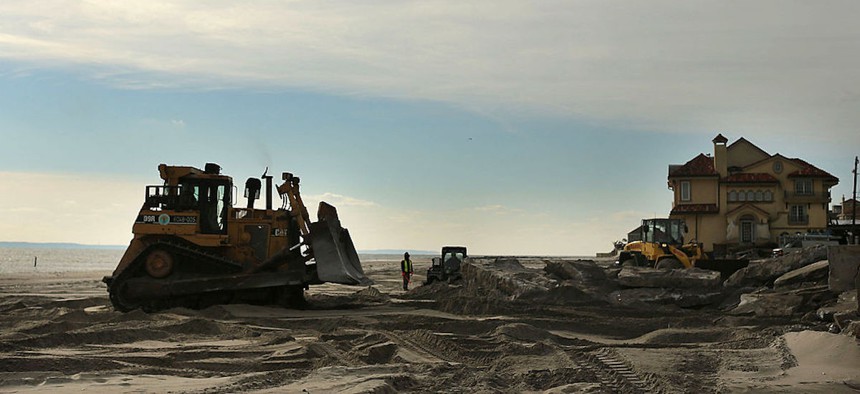Connecting state and local government leaders
North Carolina offers technical assistance to help local leaders assess their communities’ climate vulnerabilities and develop sustainable solutions.
With experts warning of more climate disasters in the future, local governments may take comfort in the fact that federal and state funds eventually head their way for response and recovery efforts. But applying for and winning climate funding ahead of a disaster is a far better strategy to prepare and build resiliency.
Recovering from a natural disaster can be a long and tortured process for local governments that lack the financial, operational or leadership capacity to address a hurricane or major flood, leaving some communities unable to fully bounce back after a crisis. These localities, according to a recent blog post from the Brookings Institution, are also more likely to lack the resources needed to apply for and obtain federal and state grants aimed at disaster recovery, response and resilience.
That means disparities among local governments’ ability to build climate resiliency will continue to widen, said Carlos Martín, director at the Joint Center for Housing Studies at Harvard University and blog post co-author. Many local governments miss out on funding because they simply don’t have the staff or expertise to navigate complex grant applications.
To prevent such inequities from worsening, state governments should acknowledge they have a role to play in helping local governments plan and prepare for natural disasters, he said.
One solution could be state-based technical assistance programs to help local agencies better understand how to apply for and manage grants for climate resilience, authors wrote.
That’s why in 2021, the North Carolina Office of Recovery and Resiliency, or NCORR, launched the Regions Innovating for Strong Economies and Environment program to help local governments proactively plan and prepare for climate hazards. Through RISE, representatives from regional councils of government across North Carolina receive technical assistance to conduct local climate vulnerability assessments. With that information, officials can develop resilience projects tailored to their communities’ needs, whether it’s improving flood management infrastructure or fortifying coastal walls to protect against sea level rise.
RISE was developed because state officials “saw there was a need for local governments to … have a vision for what their needs were in order to spend money well,” said Amanda Martin, chief resilience officer at NCORR.
NCORR offers technical assistance through workshops and other events, like its Resilient Communities Funding Forum held earlier this year. During the event, more than 200 North Carolina local officials connected with federal, state and nonprofit organizations to learn how to target available funding opportunities. One forum session, for instance, offered guidance for grant writing best practices.
During the session, Whitney Jenkins, coastal training and coordinator at North Carolina’s Division of Coastal Management, said applications that demonstrate the agency has sought and considered community feedback are more likely to be approved for funding. That detail indicates that the applicants have thought strategically about their proposal and factored in what the support or opposition from the community would have on their proposal’s effectiveness and likelihood of being successful.
NCORR also offers technical assistance for communities developing their climate resilience plans through events like the Climate Resilience DataPalooza. During the December 2021 event, public and private sector experts shared data tools and resources to help communities’ conduct climate and risk assessments. In one session, the state Department of Transportation showed officials how the DriveNC.gov database could be used as a climate vulnerability assessment tool. The map can display on-road incidents like crashes or closures caused by weather such as snow and ice. Data like that can help officials determine the infrastructure assets that are vulnerable to climate-related damage, Martin said.
The data event helped regional leaders develop resilience project portfolios with the help of stakeholder engagement committees, Martin said. The portfolios include five to 10 proposals for funding opportunities that address community needs outlined during the climate vulnerability assessment period.
For instance, the project portfolio of the Triple J Council of Governments, which constitutes Chatham, Johnston, Lee Moore Counties, included two projects that have been awarded $65,000 under the Duke Energy Foundation’s Accelerator Grant Program.
The first project looks to develop a multicounty alert system that would warn residents and first responders of potentially dangerous water levels of the Haw River, according to the council’s project portfolio. The warning system could help reduce threats to individuals’ safety and costs of river rescues in the event of a flood.
The second project is aimed at building out backup power sources at fire stations, schools and shelters. According to the council, supplying power to those critical locations is crucial for continuing public service operations during and post-disaster, which can help increase emergency response capacity and speed.
Partnering with local governments, RISE can help communities create resilience projects and smooth the process from assessment to implementation, Martin said. In their work, RISE has found proposed resilience projects that are under-researched and fail to carve out long-term resilience solutions, meaning applicants may have to rededicate time and money to the same project a year down the line. Other projects are overly complex and out of reach budget- or resource-wise for local governments, she said.
When states can offer insights, experience and technical assistance to help local officials determine appropriate climate resilience proposals they can standardize how local governments approach resilience planning, reducing the burden of wasted time and resources because of inadequate planning. It's not enough for states to simply present funding opportunities to local governments, Martin said.
Most local agency staff “don’t have the bandwidth to sit down and write a 20-page grant application,” she said. They need state partners to “hold their hand through some of the processes.”

NEXT STORY: ‘I felt so naughty’: New open carry alcohol laws boost downtowns




